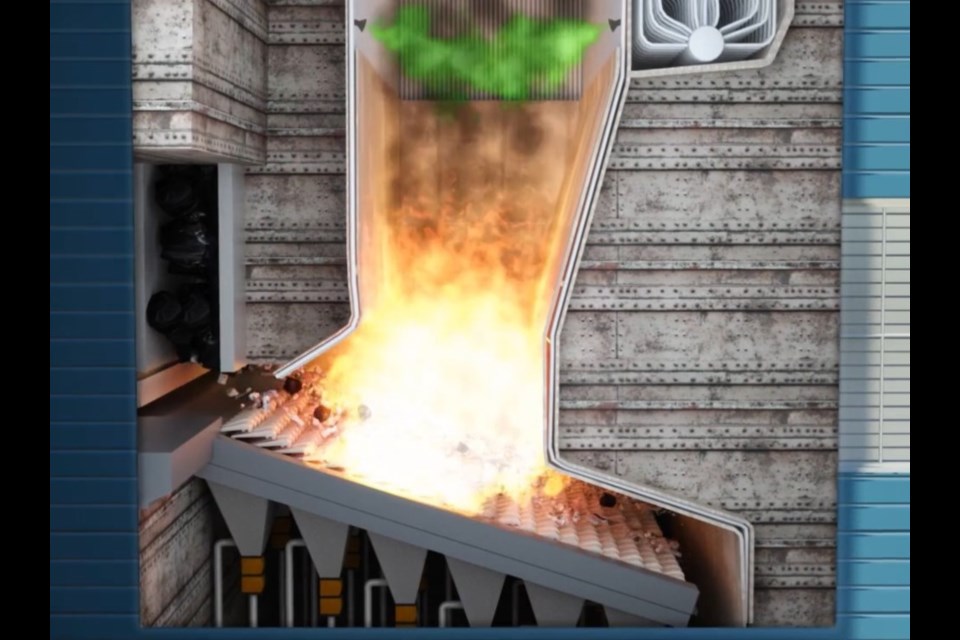As Burnaby prepares to hook up tens of thousands of new homes to a garbage-powered heating source, city council wants to explore if the public can share in its profits.
Coun. Alison Gu proposed the idea of allowing the public to invest in a new municipal heating utility.
The future District Energy Utility (DEU), the first phase of which will cost an estimated $200 million and is expected to break ground in September of this year, will take waste heat from a local incinerator and convert it into thermal energy for the space heating and hot water needs of South Burnaby homes.
Gu’s idea is to study whether the city can create a “community investment model,” like a co-operative or community bonds, that would allow B.C. residents, municipalities, First Nations, credit unions and pension funds to financially invest in the DEU and to share in its profits.
Council unanimously supported the motion at its meeting Feb. 12.
The DEU is part of Burnaby’s goal to reduce its greenhouse gas emissions: the utility is estimated to prevent about 22,000 tonnes of CO2 equivalent from being emitted when compared to business as usual, a “huge amount,” according to Gu.
'Give them the choice'
Gu said the utility has a “very strong” business case and projected financial returns.
She said the public doesn’t have many options for green investments, but this project would allow local community members to “essentially share the profits of alternative energy projects.”
“And people can actually count on a reliable financial return and feel good about where they’re putting their money,” Gu told the Burnaby NOW in an interview before the meeting.
“People want to see the opportunity to invest in these types of projects, right? People aren’t given that choice – give them the choice.”
The investment model would also act as a marketing tool (Gu called it a “foot in the door”) to pique curiosity in district energy.
“Once people start hearing about the opportunities of where to invest their money, what happens? They start asking questions, like, ‘Well, what would my money actually be doing? What is a district energy system?’ … Suddenly, people want these projects to go through because not only do they financially benefit, but suddenly, they’ve actually gone and taken five minutes of their time to read about what this project does.”
It could also “spur interest” for other cities to build their own district energy systems, Gu said.
She told the NOW she got the idea at a conference in Ottawa last year, where a mayor of a small island town in Sweden spoke.
The town had gone to 100 per cent renewable energy, and the mayor attributed it to giving the community the ability to invest in its renewable energy projects, so they could benefit from the financial profits.
Councillors intrigued
Coun. Daniel Tetrault supported the idea, noting it's not always easy for individuals to find ethical investment opportunities.
Tetrault, formerly the president of the Burnaby Teachers’ Association, said it’s also a challenge for many unions to find ethical pension investments.
“I know there’s many debates within unions right now, including teacher unions, where we’re looking to divest from fossil fuels and looking for more local, ethical, sustainable opportunities, and this would be a great opportunity if feasible,” he said at the meeting.
Coun. Richard Lee called the idea an “interesting proposal” and asked why the investment would be restricted to certain community groups and not open to the global investment community.
“Overall, I think open(ing) up to investment is good and reduce the liability for the city, but it has to be a good investment, business case,” Lee said.
But there could be some challenges in implementing Gu’s idea.
Municipalities are not currently allowed to start an organization with outside investments, due to the Community Charter, which governs what B.C.’s municipalities can and can’t do, according to Noreen Kassam, Burnaby’s chief financial officer and deputy CAO.
Kassam said it could be possible if the DEU is formed as an arm’s-length entity.
“But if it’s tied in any way to the city, there would need to be alterations to the Charter,” Kassam said.
She gave an example that staff once looked at a “City of Burnaby bank,” but the province would not allow it.
Coun. Pietro Calendino also asked whether the DEU would fall under the regulation of the B.C. Utilities Commission and about what the timeline for recovering the investment would be.
Mayor Mike Hurley said Gu’s motion only asks staff to study the possibility of such an investment model consider those issues in the process.
Staff will analyze the proposal and report back to council at a later date.
Burnaby District Energy Utility: in brief
Burnaby’s new heating utility will be powered by waste heat from the Metro Vancouver incinerator, the Waste-To-Energy Facility (WTEF), in the Big Bend neighbourhood.
The DEU will take the waste heat from the incinerator (the steam created by burning garbage), which will be recovered to heat water. That heated water will be pumped through regional pipes to energy centres in Metrotown and Edmonds, which will connect through more pipes to homes.
The DEU is planned to service most of Metrotown and Edmonds (about 30,000 homes, mostly in multifamily complexes) and may expand outside of those town centres. It won’t service any homes north of the Trans Canada Highway.
The city expects the first phase of the DEU in Metrotown to be complete in 2026.
The city says it will provide the energy “at or below market rates.”
For more information about the Burnaby DEU, see the city’s webpage.





